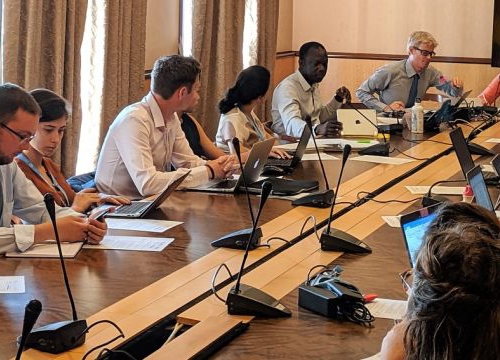Productive Discussions for the Panel Event on ‘Human Rights and Digital Technologies: New Insights’
23 July 2019
Co-organized with the Geneva Internet Platform, the Swiss Federal Department of Foreign Affairs and the United Nations (UN) Special Procedures, the panel discussion ‘Human rights and Digital Technologies: New Insights’ brought together panelists with expertise from the UN Human Rights Committee, the UN Office of the High Commissioner for Human Rights' Special Procedures, the Secretariat of the UN High-Level Panel on Digital Cooperation, and our research project ‘Human Rights in the Digital Age’.
The event took place at the Palais des Nations during the 41st session of the UN Human Rights Council (HRC) and brought together more than 40 participants — diplomats, representatives of international organizations and NGOs, and scholars — who had the opportunity to discussed nascent challenges in the sphere of evolving digital technologies and their impact on human rights. Particular attention was drawn to identifying opportunities for states, civil society and other relevant stakeholders to determine effective strategic approaches to facilitate preparation for the future impacts of emerging digital technologies by the panel members.
Shifting Power Structures between Governments, the Tech Industry and Citizens
Professor Yuval Shany’s intervention provided scope to reflect on the evolving paradigm of stakeholders’ obligations and responsibilities and proved particularly insightful for his reflection as to the ever evolving relationships between government, the tech industry and citizens — notably in terms of shifting power structures and the subsequent impact on normative and regulatory frameworks.
Clément Voule, the UN Special Rapporteur for Freedom of Peaceful Assembly and Association spoke of the key findings in his recent report to the HRC on current developments regarding the enjoyment of these rights online. He highlighted the inherent tensions to be observed where social media platforms and other forms of online communication can both facilitate engagement and, at the same time, stifle broader debate amongst communities.
The Need to Engage other Sectors to Address Human Rights Challenges Arising from New Uses of Digital Technologies
Dr Jovan Kurbalija, Founding Director of DiploFoundation and the Head of the Geneva Internet Platform, spoke of how challenges to human rights from new uses of digital technologies are continuing to emerge online, noting that those concerned with the protection and safeguard of these rights would have to reach out to and engage other sectors if meaningful progress is to be made. In particular, Dr Kurbalija stressed the importance of engaging in discussion with the tech industry, and of taking into account the impact of any change or regulation on the commercial interests and business models of companies that are affected. Furthermore, with regard to the transformation of society by the process of digitalization — seemingly influencing almost every facet of human activity — it was underscored that we need to consider how we retain scope to acknowledge that we are all deficient in some regard: thus we must protect ‘the right to be humanly imperfect’ and not allow profiling to undermine our identities and autonomy.
Protection of Nascent Democratic Spaces in the Digital Sphere
In his contribution to the debate, Clément Voule highlighted the specific recommendations he made in his report to companies operating in the tech and telecommunications sectors in order that their activities might better protect and promote human rights. He also drew attention to the challenges that continued to develop and hinder activists and civil society in exercising their right to assemble and associate in physical spaces, offline: this now meant that protecting nascent democratic spaces in the digital sphere was now more important than ever. Moreover, the Rapporteur also underscored the criticality of ensuring that the existing international legal framework to safeguard human rights could evolve and be adapted so as to continue protecting assembly and association amongst individuals and groups.
The Importance of Education and Training
Our Research former Fellow Dr Jonathan Andrew continued the discussion by emphasizing the necessity of apprehending just how different the dialogue could be between the respective stakeholders as they debated their own roles and responsibilities. In this respect, it was further highlighted how different stakeholders might use different language and terminology that could distance or even confuse other parties interested in participating in a broader discussion of digital rights. Dr Andrew, therefore, insisted that it was imperative that we allow ourselves the opportunity to be open to new ideas, and that we make the effort to learn more about the different interests and concerns of all those involved in resolving the issues we currently face as a society. In addition, Dr Andrew also drew attention to the broader importance of education in maximizing the benefits that new and emerging digital technologies could deliver: without a focus on delivering training and developing skills, the positive impacts of tech may not be realized.
In addition, it was also emphasized that existing inequalities might only worsen if resources are not utilized effectively to empower marginalized communities through improved connectivity to the Internet and developing knowledge amongst those that have in the past been disenfranchised.











